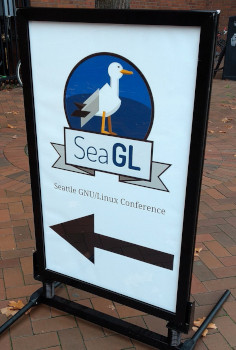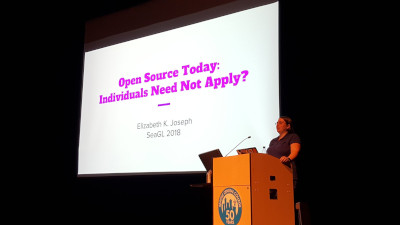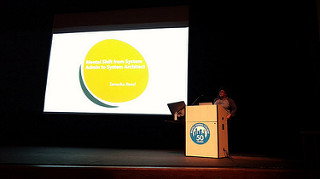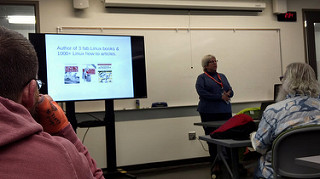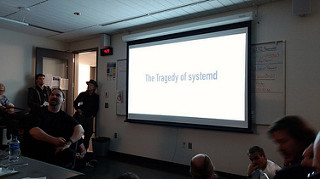I had the pleasure of participating in SeaGL this year. This conference was a special one in my calendar because it’s the last conference on my schedule before our son arrives, my key participation was in the form of giving one of the keynotes, and they were very transparent about their efforts to make a diverse schedule and shared the acceptance results. According to their statistics, 44% of the talks the accepted were from people who self-identified as a member of an under-represented group in tech.
Diversity is important to me, and not just on a feel good level of finally giving voice to people whose views and perspectives have traditionally been marginalized or ignored. I enjoy the energy and welcoming feeling that I find diverse conferences. The diversity of speakers also shows through in the talks themselves, as people with different backgrounds and life experiences will often give very different styles of talks without (and this is important!) compromising on quality or level of technical depth. It makes the experience of spending a day drifting between technical talks much more enjoyable.
So I’ll start by saying thank you to the organizers of SeaGL for the work they put into crafting such an excellent line-up of diverse speakers. Your efforts were noticed and I had a wonderful, educational time as a result.
The keynote I put together for this conference was months in the making. As I reflected on the work I’ve done in open source communities over the past 17 years, I’ve lived through a massive shift in the types of projects, contributors, and companies involved. I also found myself wondering where an individual contributor from the year 2001 would fit into this modern landscape. When I pitched this idea to the conference organizers as a topic for my talk, I only really had my own observations and random chats with other people whose background is similar to mine at conferences over the past couple of years, most of whom were feeling they had lost motivation to contribute outside of their work in tech. In preparation for this talk, I strategically expanded my pool of people to talk to, and also sent out an anonymous survey asking for feedback from anyone who had thoughts to share about their motivations.
With all this data collected, I had an interesting picture of the state of open source today. The gist of my keynote was that open source has changed since the creation of the term 20 years ago. Some of these ways are uncomfortable for people who have been around that whole time, especially with regard to the influx of money that has caused the environment to change in significant ways. However, there is a lot of good that comes of this too. A lot of us are now paid to work on open source and the opportunity to be paid has opened the doors to folks who may not have traditionally been able to participate. The adoption and support by mainstream firms has made it a more compelling option for non-profits and other local organizations that are rewarding to work with. The investment by for-profit companies in the development tooling landscape is making it easier for contributors to work across projects. I covered these things and more in a hopeful view into the present and future role individuals play in open source today. Slides from my talk can be found here: SeaGL2018-OpenSourceToday-IndividualsNeedNotApply.pdf.
My keynote was followed by one from Molly de Blanc who took us on a very personal glimpse into how technology can be a positive influence mental health, especially when it comes to connecting us instantly to our support networks. On the software freedom side, she explored choices we make with regard to our privacy and security, and trade-offs we may be encountered with as we use different platforms and tools.
With this being my last conference for a while, I went to a couple talks that first day, but ended up spending most of the rest of the day in the “hallway track” as I enjoyed lunch with some folks who worked in and around Debian, and generally catching up with people I’ve known from past jobs and communities.
Day two kicked off with a keynote from Stephen Walli on The Democratization of Software. He looked back at history to demonstrate that freely shared software was more the norm than the exception, and discussed how frictionless it is for anyone to get involved with developing software these days if given the time. Getting access to the code and improving upon it is now essentially a solved problem. Our real challenge today is operating the software securely and reliably at scale, and that’s more difficult. He posited that several of the major vulnerabilities in open source software were not in fact failures in open source, but our methods for testing and deploying the software into production. The problems caused by something like left-pad being removed from NPM shouldn’t have happened on production systems because it should have been tested and the dependency chain thoroughly vetted.
Next we heard from Tameika Reed, Linux systems engineer and founder of Women In Linux. I had the pleasure of hearing from Tameika just a few weeks earlier as she gave one of the keynotes at LISA in Nashville, and it was a pleasure to not just see her again, but sit through one of her keynotes filled with wisdom and humor. In this talk the focus was on making the mental shift from System Administration to System Architect or Team Lead. She stressed the importance of how your view into the work your doing has to change from focusing on a small component of the technical work to stepping back to get the 30,000 foot view. From there you dril down into that to get a view of how the work of your team impacts the organization. She also stressed the human side of a more senior or management role, and that having empathy was key.
After the keynotes I found myself really enjoying a talk by Lucy Wyman about being tactful about what you automate in your infrastructure. Putting pressure on people who want to “automate everything” she outlined some times when you might not want to, like when the complexity of the task means that you have more exceptions to your automation strategy than rules, and would spend a lot more time reconfiguring your automation than you’d actually find value from. What I really loved about this talk though was her invitation of audience participation. In addition to sharing thoughts at key points in her presentation, her findings were validated by real stories from the audience about times that automation went terribly wrong. Plus, they were often really funny, if painful, stories that I think made for a dynamic presentation that took on a life of its own.
I also attended a talk from Duane O’Brien on the risks of heavy handed use of GitHub profiles and activity when evaluating candidates for roles in your organization. There may be a place for it as one piece of criteria that you check, but it excludes a lot of open source projects, disadvantages people who couldn’t work in the open in past roles or don’t have time to do open source work during their personal time. Aricka Flowers does a great job of writing a whole article on the talk over on the GitLab blog: We all love open source, but hiring based on contributions could be harmful.
After Duane, I was thrilled to hear a talk from Carla Schroeder. I met Carla online via LinuxChix well over a decade ago. I pitched in with editing one of her books long before I was known professionally and that gave me an incredible confidence boost at a time I really needed it. As someone who open doors for me so early in my career, I’m eternally grateful and was happy to finally meet her in person. In her talk on documentation, she went through the characteristics of good documentation, several suggestions for documentation layout and linking strategies, and the importance of crafting your pages for good SEO.
The final slot in the schedule went to a very popular talk: The Tragedy of systemd by Benno Rice. Even before the conference I knew this is one of the talks I wanted to see. As a FreeBSD developer, Benno brought an interesting perspective to the discussion of systemd, along with Unix history and the path that Apple’s OSX took with launchd. I am still unconvinced that systemd is the solution to our increasingly complicated world of init systems, but his talk did bring up some interesting points about how we’ve approached them in the past and the value that systemd creator Lennart Poettering brought to the Linux world by introducing systemd. He recommended Poettering’s Rethinking PID 1 which digs into the guts of the philosophy behind systemd and went on to address many of the criticisms. I certainly appreciated the talk a lot and while this delivery wasn’t recorded, his version of the talk given at BSDCan was (Benno Rice: The Tragedy of systemd — BSDCan 2018) and I’ve sent it to a few people already. Thanks to Benno for approaching such a controversial topic with evidence and positivity, I learned a lot.
Sadly, that concluded the conference for me! There was an after party, but I had decided to head home that night so I could sleep in my own bed and avoid the additional hotel night expense.
More photos from SeaGL can be found here: https://www.flickr.com/photos/pleia2/albums/72157675535928818
Thanks again to all the organizers and other volunteers for making my last conference for a while such a great experience!


